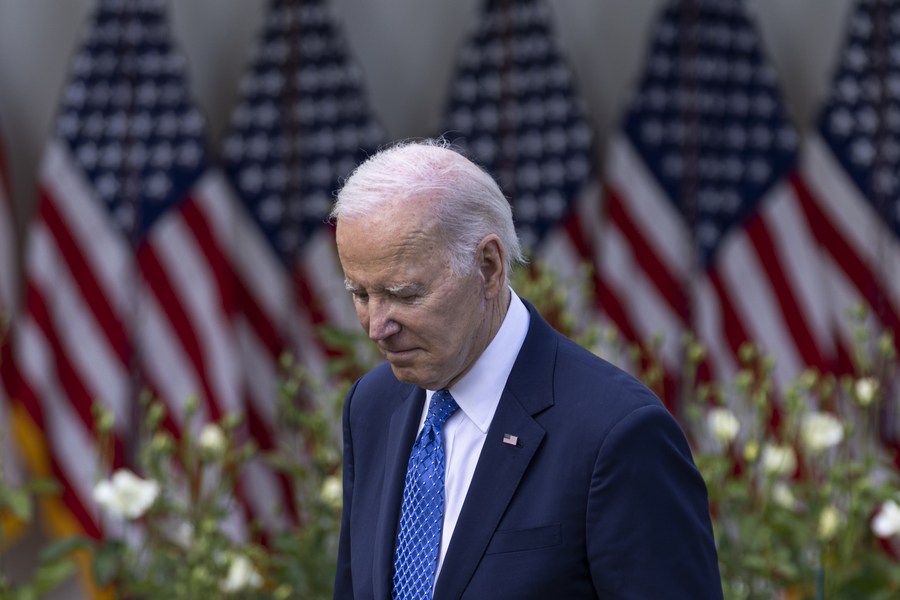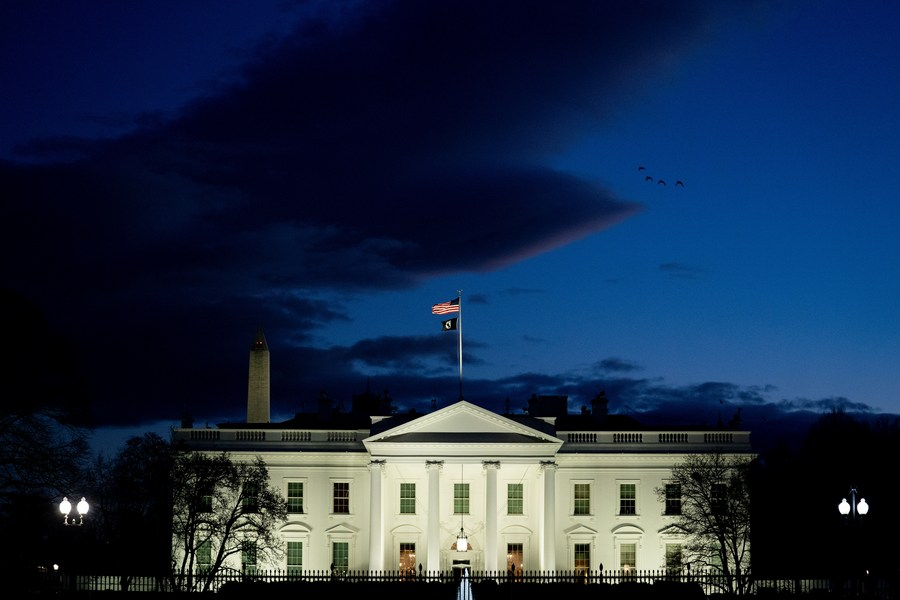
U.S. President Joe Biden is pictured during an event at the White House in Washington, D.C., the United States, April 24, 2023. (Photo by Aaron Schwartz/Xinhua)
It is not uncommon for the U.S. federal government to halt its operations due to intense political fights between the two parties, especially as partisan hostility has grown in recent years.
by Maoling Xiong
WASHINGTON, Sept. 28 (Xinhua) -- A U.S. federal government shutdown now looks increasingly likely, as a Senate-proposed stopgap funding measure has a slim chance to advance in the House amid Republican infighting, which has complicated the already intense fight between the two parties.
Traditionally, the House of Representatives moves first on spending and revenue bills, but U.S. House Speaker Kevin McCarthy failed to gain support from his own party on a stopgap funding bill, forcing senators to make the first move in the last week ahead of a shutdown.
The Senate-proposed bill is expected to fund the government until Nov. 17, the week before Thanksgiving, with the funding levels continuing at the same levels as before. It includes roughly 6.1 billion U.S. dollars of aid for Ukraine and about 6 billion dollars for domestic disaster relief.
Senate Majority Leader Chuck Schumer described the "continuing resolution" as a "bridge" to buy negotiators more time to reach an agreement on a longer-term funding bill.
The Senate voted 77-19 to advance the bill Tuesday, demonstrating rare bipartisanship at a time when Congress has become increasingly polarized. Senate Minority Leader Mitch McConnell and the White House have both endorsed the measure.
However, it remains to be seen whether the House will advance the plan in time to avert a shutdown, with only three days to go before government funding for fiscal year 2023 expires.
"I don't see the support in the House" for the Senate bill, McCarthy told reporters Wednesday. He told Republican lawmakers at a closed-door meeting on the same day that he would not take the Senate bill to the House for a vote in its current form.
One point of contention is the aid to Ukraine. Conservative Republicans in the House oppose providing more aid to Ukraine, arguing that the Biden administration should make deep spending cuts and that aid to Ukraine should be part of it. The second point of contention is that House Republicans want to pass a bill that includes border security provisions, which reveals the partisan divide over immigration policy.
"If they want to put focus on Ukraine and not focus on the southern border, I think their priorities are backwards," McCarthy said Tuesday about the Senate measure.
Schumer on Wednesday lashed out at McCarthy for "constantly adhering to what the hard right wants," saying that this approach will inevitably lead to a shutdown. McConnell, meanwhile, said "shutting down the government isn't an effective way to make a point."
But McCarthy's difficult situation in the House leaves him little choice but to "please" the right wing of the Republican Party. After last year's midterm elections, the Republican Party retook over the House, with control of 221 seats, just nine more than the Democratic Party's 212 seats, meaning that even five "rebels" are enough to defeat a Republican legislative agenda.
McCarthy previously proposed a short-term funding bill that would cut spending for most federal agencies by 8 percent and tighten immigration restrictions, but conservatives within the Republican Party oppose the bill, and it is unlikely to win support from Democrats. Republican conservatives oppose any "patchwork" funding package and want Congress to negotiate all 12 annual spending bills individually.
In an attempt to appease hard-line Republicans, the House on Tuesday voted to advance four bills that would fund the Departments of Defense, Homeland Security, State and Agriculture for another fiscal year. But such efforts won't be able to prevent a government shutdown.
In any case, Congress remains deadlocked over how to fund the government, increasing the likelihood of what could be the 22nd government shutdown in U.S. history.
An "unscientific" poll of budget experts released Tuesday by Committee for a Responsible Federal Budget -- an independent budget watcher -- showed that the probability of a government shutdown has soared to 87 percent, up from 58 percent at the end of August.
It is not uncommon for the U.S. federal government to halt its operations due to intense political fights between the two parties, especially as partisan hostility has grown in recent years.

This photo taken on Jan. 20, 2023 shows the White House in Washington, D.C., the United States. (Xinhua/Liu Jie)
The most recent and longest government shutdown occurred from late 2018 to early 2019 when Democrats opposed funding for the U.S.-Mexico border wall proposed by then-President Donald Trump, and the two parties were stuck in a stalemate over immigration issues, leading to a five-week shutdown.
In 2013, during the Obama administration, some conservative Republican lawmakers blocked the implementation of Obamacare, leading to a 16-day government shutdown.
If the two parties cannot reach an agreement on time, part of the federal government will be closed starting from Oct. 1. All non-essential operations will be suspended, and all but the government's most essential workers will be furloughed. Essential departments such as the military, border defense and public security are unaffected.
Greg Cusack, a former member of the Iowa House of Representatives, told Xinhua the crisis is "embarrassing and infuriating."
Moody's Investors Service warned earlier this week that a government shutdown could hurt America's top credit rating, as it would underscore the weakness of U.S. institutional and governance strength relative to other AAA-rated sovereigns.
A long-drawn-out stalemate could negatively impact the economy. JPMorgan estimates that each week of government shutdown reduces GDP growth by 0.1 percentage point.
Economic activity appears to have accelerated in the third quarter but "should see a lull" in the fourth quarter owing to the auto workers' strike, the restart of student loan payments and a probable government shutdown, said Karen Dynan, a nonresident senior fellow at the Washington D.C.-based Peterson Institute for International Economics.
Gregory Daco, chief economist at EY-Parthenon, expects U.S. economic growth to slow sharply to an annualized 0.6 percent rate in the fourth quarter.■












